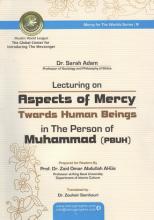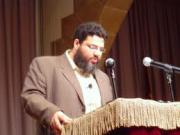The Prophet of Mercy Website
Muslim World League - Global Commission for Introducing the Messenger
The Prophet (Peace be upon him) exhorted the Muslims to treat the prisoners so well to such an extent that the captors used to give the captives their bread (the more valued part of the meal) and keep the dates for themselves.
Prisoners of war constituted a problem awaiting resolution because it was a new phenomenon in the history of Islam. The Prophet (Peace be upon him) consulted Abu Bakr and ‘Umar bin Al-Khattab as to what he should do with the prisoners. Abu Bakr suggested that he should ransom them, explaining this by saying: “They are after all our relatives, and this money would give us strength against the disbelievers, moreover, Allâh could guide them to Islam.” ‘Umar advised killing them, saying, “They are the leaders of Kufr (disbelief).” The Prophet (Peace be upon him) preferred Abu Bakr’s suggestion to that of ‘Umar’s. The following day, ‘Umar called on the Prophet (Peace be upon him) and Abu Bakr to see them weeping. He shextreme astonishment and inquired about the situation so that he might weep if it was worth weeping for, or else he would feign weeping.
The Prophet (Peace be upon him) said that a Qur’ânic verse had been revealed rebuking them for taking ransom from the captives rather than slaying them:
“It is not for a Prophet that he should have prisoners of war (and free them with ransom) until he had made a great slaughter (among his enemies) in the land. You desire the good of this world (i.e. the money of ransom for freeing the captives), but Allâh desires (for you) the Hereafter. And Allâh is All-Mighty, All-Wise. Were it not a previous ordainment from Allâh, a severe torment would have touched you for what you took.” [8:67,68]
The previous Divine ordainment went as follows,
“Thereafter (is the time) either for generosity (i.e. free them without ransom) or ransom.” [47:4]
Which included an area providing permission to take ransom, that is why no penalty was imposed. They were rebuked only for taking prisoners before subduing all the land of disbelief. Apart from this, the polytheists taken to Madinah were not only prisoners of war but rather archcriminals of war whom modern war penal law brings to justice to receive their due sentence of death or prison for life.
The ransom for the prisoners ranged between 4000 and 1000 Dirhams in accordance with the captive’s financial situation. Another form of ransom assumed an educational dimension; most of the Makkans, unlike the Madinese, were literate and so each prisoner who could not afford the ransom was entrusted with ten children to teach them the art of writing and reading. Once the child had been proficient enough, the instructor would be set free. Another clan of prisoners were released unransomed on grounds of being hard up. Zainab, the daughter of the Prophet (Peace be upon him), paid the ransom of her husband Abul-‘As with a necklace. The Muslims released her prisoner and returned the necklace in deference to the Prophet (Peace be upon him) but on condition that Abul-‘As allow Zainab to migrate to Madinah, which he actually did.
In captivity, there was also an eloquent orator called Suhail bin ‘Amr. ‘Umar suggested that they pull out his front teeth to disable him from speaking, but the Prophet (Peace be upon him) turned down his suggestion for fear Quraish should retaliate in the same manner on one hand, and on the other for fear of Allâh’s wrath on the Day of Resurrection.
Sa‘d bin An-Nu‘man, a lesser pilgrim detained in Makkah, was released in return for setting Abu Sufyan’s son, a captive, free.
******






